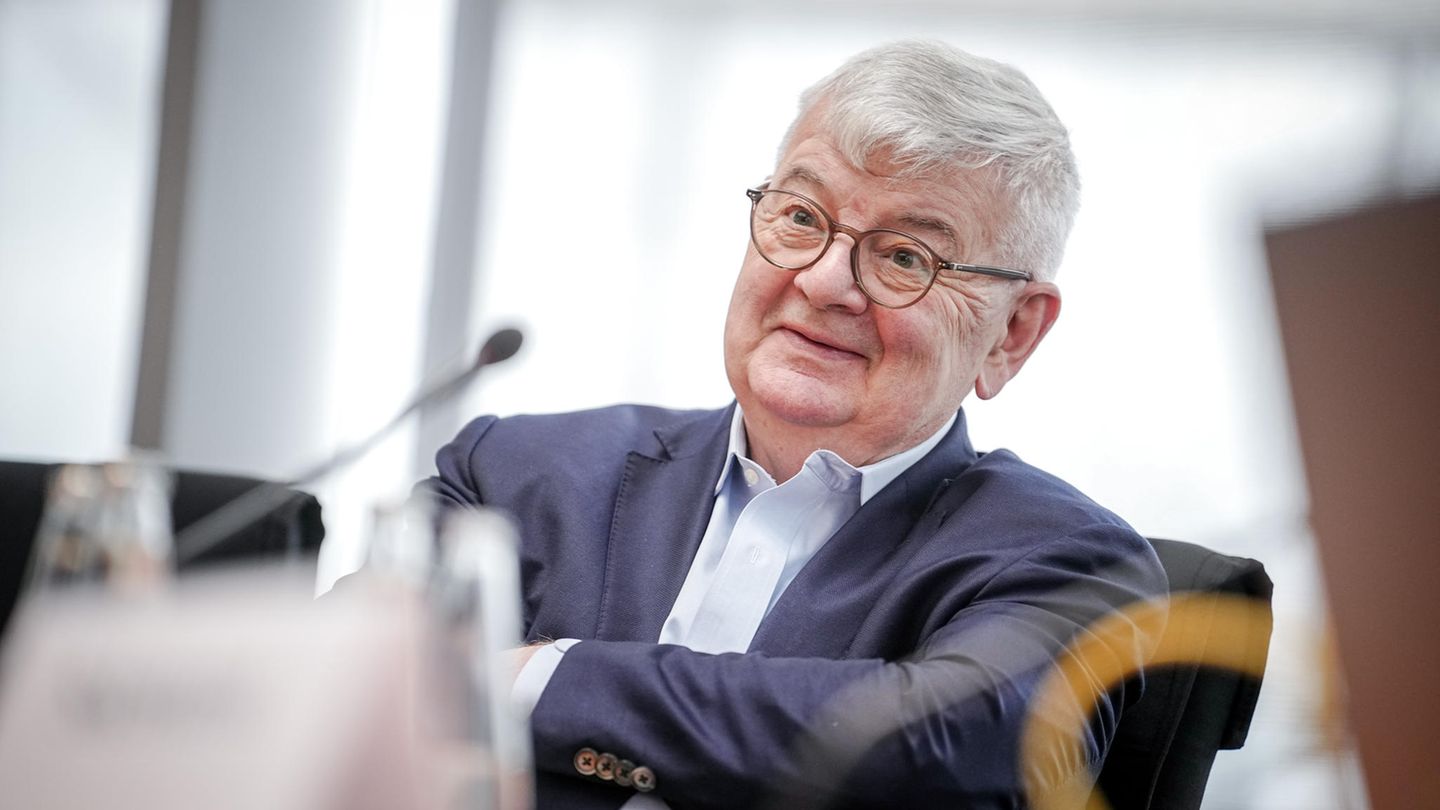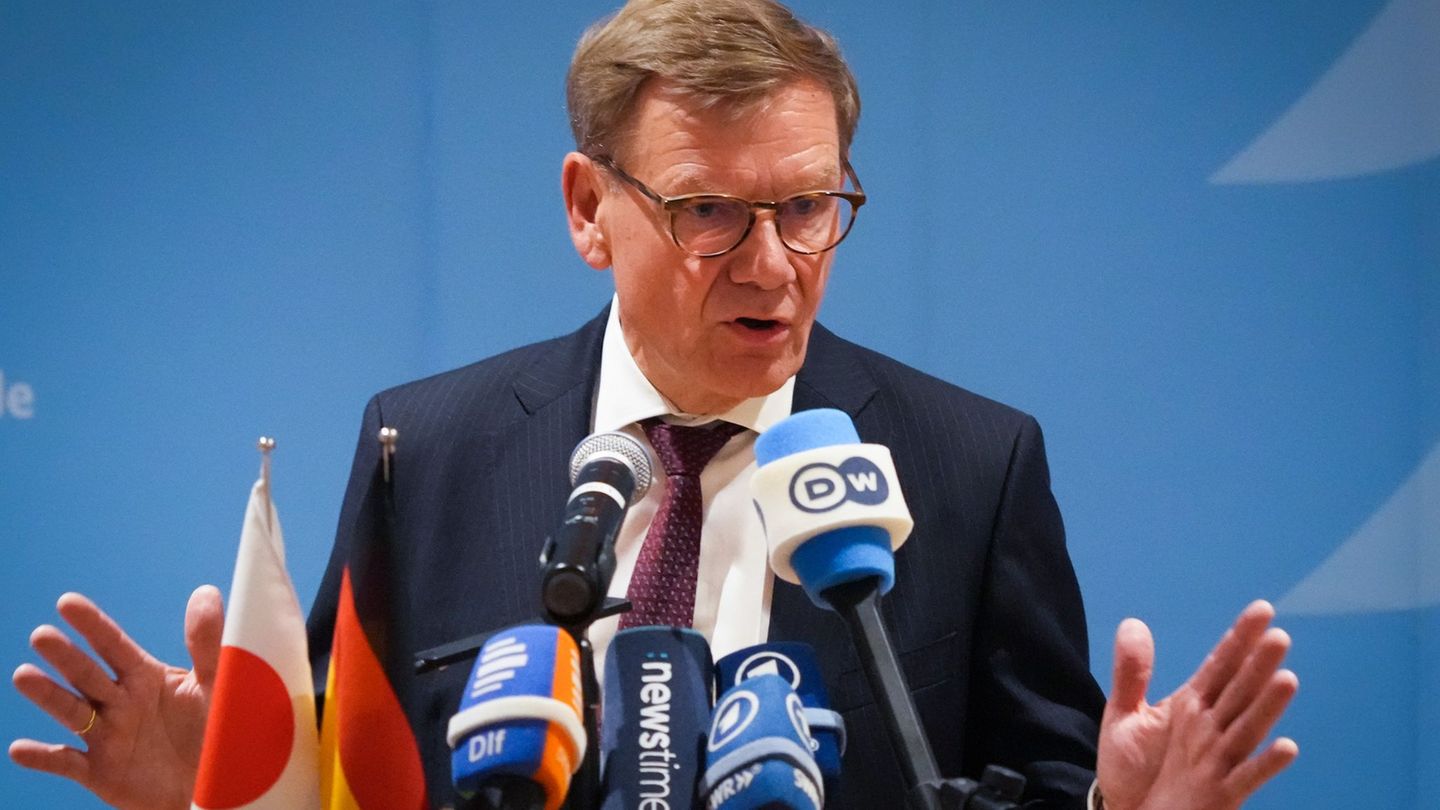Joschka Fischer, ex-Foreign Minister and strategist for the Greens, draws his lessons from the disastrous German mission in Afghanistan.
The Taliban ruled Afghanistan, and the food situation was terrible. Joschka Fischer was just 50 years old, Federal Foreign Minister and busy finding humanitarian solutions. Difficult in a closed country with terrorist training camps. “The newborns died like flies and so did the women and mothers, there was a famine every winter,” he says. None of that interested anyone at the time. Not in Germany, not even in the Bundestag. “The CNN Effect was non-existent”.
Then came September 11, 2001, a Tuesday. “The attack on downtown Manhattan and Arlington, on the Pentagon, the high human casualties in the collapsing Twin Towers”. In addition, there was the fear that a fourth plane would head for the White House. CNN in endless strip. “It was a shock and a double shock for the Federal Republic of Germany. Because the decisive group of perpetrators had spent a long time in Hamburg-Harburg.” The political risk lay in the fact that Germany might have been able to prevent the attacks against the protecting power for its national security. That then dissolved, says Fischer, because the US security authorities had to carry their own responsibility in preparing for these terrible attacks.
“We could have said no – but at what cost?”
It is one of Joschka Fischer’s rare appearances, on Monday in the semicircle of room 4900 in the Paul-Loebe-Haus of the Bundestag. The 75-year-old Green Icon, Vice-Chancellor and Foreign Minister in Gerhard Schröder’s cabinet from 1998 to 2005, is one of four top-class experts to be heard by the Enquete Commission. Here, parliamentarians and experts are to take stock of 20 years of action in Afghanistan and draw lessons for future international missions from the ultimately shameful failure.
In the background, interpretations are being wrestled under the leadership of the SPD, which has held government responsibility for Afghanistan for the longest time. Fischer, gray hair, slim, folds his arms when referring to the time budget for his statement and his answers.
So, September 11th. “It was clear to us that the cards would be completely reshuffled in the alliance,” he says, looking back. Chancellor Schröder declares Germany’s “unrestricted solidarity” with America. The foreign minister rushes to Brussels and gets the alliance case according to Article 5 on the table in the NATO Council. Fischer asks for a short break, calls Schröder, “we had to stay in solidarity with the alliance”. Appropriate decisions are made to take part in a war in Afghanistan, which soon began as an invasion by the US and the British.
Difficult domestically, says Fischer, but “from the perspective of the time, it had to be.” The Hamburg conflict researcher Anna Geis from the Enquete Commission digs deeper: were there really no alternatives to the federal government’s decisions after 9/11?
Joschka Fischer: “Professor Geis, there is rarely no alternative in this life. Actually, only life itself, which ends with death as an iron certainty. We could have said no – but at what price? Then we would have the security architecture of the Federal Republic Germany completely devastated I also needed my time until I understood it: Alliance obligation, result of our history, Cold War, German division, European development Anyone who shakes it up without hesitation will question everything that has been achieved since 1949. When I got up in the morning, I would not have thought that in the evening we would declare solidarity with the USA via Article 5”.
A rough event
Nevertheless, the decision was anything but easy. The term “unrestricted solidarity” with America would never have crossed the lips of then Federal President Johannes Rau. He doesn’t want to follow the logic of war. The green base is rebelling against the federal government’s war policy, and Fischer is still hearing the debates about the Kosovo mission. In November 2001, the Bundestag narrowly expressed its confidence in the Chancellor, paving the way for the Bundeswehr’s first combat mission outside of Europe.
A little later, Bonn is the venue for a major peace conference for Afghanistan. Joschka Fischer opens the Petersberg Conference, also with the point to give women in Afghanistan their dignity back and the broken state structures. “It wasn’t like we started there with a large competence box full of contacts,” says Fischer in retrospect. “Militarily, developmentally, diplomatically, we didn’t have much.” However, the cooperation with the Americans was “trustworthy”. Taliban participation was out of the question, “then the conference would not have taken place.”
It was a rough event. “You were in the room with people you wouldn’t normally sit with, given their biographies and their responsibility after the Red Army left and the Afghan civil war,” says Joschka Fischer. You just had to create the broadest possible basis for Afghanistan. “That had a price. The country was not comparable to a European country.” “Things” were also experienced in the Balkans and then armistice talks and negotiations had to be held. “Under the Dayton Agreement is the signature of Milosevic”.
In Afghanistan, the Bush administration was interested in Al Qaeda, bin Laden, fighting the enemy. State Building thought important people in Washington were nonsense. The Taliban were driven out. Joschka Fischer says that Pakistan’s role in the overall situation in Afghanistan “cannot be weighted too heavily.” For the US, Pakistan was of crucial importance as an ally with the port of Karachi and militarily. But Pakistan gave the Taliban a rear, Mullah Omar was behind the border in Quetta for a long time, and the Pakistani secret service ISI “remained a black box,” as Fischer says. “In the Pentagon, you closed your eyes where you should have looked very closely.”
In retrospect, Joschka Fischer sees the debacle
For the US government, Afghanistan soon moved down the agenda. After the military success on the ground, the Americans would have withdrawn their best military teams. The BND president at the time told him the direction was Iraq, says Fischer. “I have always referred to Afghanistan as the first casualty of the Iraq war.” Saddam Hussein and Al Qaeda fought each other, the rumored ideas about weapons of mass destruction turned out to be “fantasy” “relatively early” on the basis of checks by inspectors and cooperation between services.
Chancellor Schröder later supplemented the original vote of “unrestricted solidarity” with the wording that Germany would not take part in adventures. “That was a conditional clause, Mr. Schröder was a lawyer,” says Fischer.
And the sentence that Joschka Fischer himself shouted out to US Secretary of Defense Rumsfeld at the Munich Security Conference, when he was looking for a war in Iraq, is legend (and Fischer’s book title): “Excuse me, I am not convinced.” Germany’s no to the Iraq war caused huge political upheavals in Washington and Berlin. According to Fischer, at times major diplomatic efforts were necessary to maintain contact with the United States “because of our position on this damned Iraq issue.”
Joschka Fischer was Federal Foreign Minister until 2005. In retrospect, of course, he sees the debacle, “I don’t want to talk about the hasty and hasty withdrawal now,” he told the commission of inquiry. The Afghanistan mission only ended with the de facto unconditional withdrawal of troops by the Trump and Biden governments in August 2021. “Afghanistan will remain a place of insecurity for a long time to come,” says Joschka Fischer. It was foreseeable that the Taliban “would not leave anything untouched” as far as the difficult, small successes for women and girls are concerned. “It’s terrible when you look at the situation today.”
How the various approaches and logics of German actors and ministries in Afghanistan could have been better coordinated and what a strategic approach could have been was of secondary importance at the hearing of the expert Fischer. On the subject of “National Security Council” he shook his head. “One should not follow such official fantasies.” He does not believe that the problems can be solved in this way. “The National Security Council is an American model, and the Americans have a presidential system. We don’t have a presidential system, which some chancellors may have found difficult to accept. We have individual responsibility for the departments.”
“If we want to achieve more politically, we will have to offer more militarily”
Joschka Fischer concedes self-criticism when it comes to the “lack of military strength that we had at the time.” The weak, logistically overwhelmed, ruined Bundeswehr. All parties were involved in this process, “I don’t exclude my own”. The consequences are essential: “We have to be prepared for tougher missions. That’s the only way we can gain political influence. I consider that to be my personal lesson from the Afghanistan mission.” And further: “You can suggest the best things to the Americans, if you don’t have the hard power, it won’t be feasible.”
Fischer’s former department colleague sits to his right, Heidemarie Wieczorek-Zeul, who was Development Aid Minister from 1998 to 2009. The SPD politician was often in Afghanistan and is now also heard as an expert. When she emphasizes that the brutal actions of the US military in Iraq and Afghanistan, for example in torture prisons, could have been dealt with more openly, especially since everything has become known anyway, Fischer says there is no question that Abu Ghraib and other incidents were extremely negative had effects in the Muslim world and also promoted radicalization. “But I resist the impression that the United States was the bloody one and we were the gentle, good, dear people of development cooperation. It wasn’t like that. The security of our people also depended to a large extent on the security guarantees of the United States and the British. “
This brings Joschka Fischer to the crucial point, to the realization that has become his priority. “Don’t be under any illusions about our dependency today. If we want to achieve more politically, we will have to offer more militarily. And especially today we know how much we depend on the United States for our security.” And while mentioning the keyword Ukrainians, he adds: “It will remain so in view of the dangers of the alliance’s eastern borders.”
It is 3:57 p.m. and the questioning of the experts before the Bundestag commission of inquiry on Afghanistan is over after almost three hours.
Heidemarie Wiecziorek-Zeul takes a deep breath: “Yes, Josef, that’s how it is.”
“Make a wish, take care,” says Fischer.
Source: Stern
I have been working in the news industry for over 6 years, first as a reporter and now as an editor. I have covered politics extensively, and my work has appeared in major newspapers and online news outlets around the world. In addition to my writing, I also contribute regularly to 24 Hours World.




